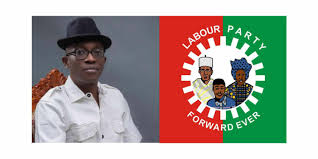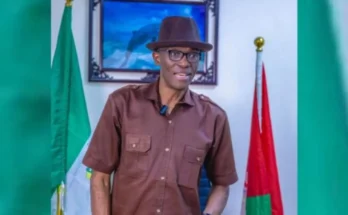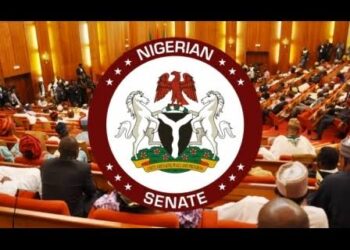Initially, the Senate said it would not be business as usual in the screening of President Mohammadu Buhari’s executive cabinet nominees. It sent a message that the comradelier treatment which reflected in ‘‘Bow and go’’ in past exercises would not apply, thus creating anxiety that nominees’ confirmation would not be an easy one. But it was a different ball game as JOHN NWOKOCHA presents a refreshing recap of the dramas that played out at the Red Chamber during the exercise.
The Senate on Tuesday commenced the screening of the first batch of 21 ministerial nominees submitted by President Muhammadu Buhari on September 30. The President sent two batches of nominees to the Senate. The Senate President, Dr Bukola Saraki, read the names of another 16 on Tuesday, Oct 13 bringing the total to 37 nominees.
The Senate screened only 10 of the nominees on Tuesday, following a motion by Senate Leader, Ali Ndume. At the end of sessions this week the senate had screened 16 nominees.
Those who appeared before the senate on Tuesday were Udoma Udoma, Kayode Fayemi, Audu Ogbeh, Osagie Ehanire, Abdulrahman Dambazzau, and Lai Mohammed.
Others were Suleiman Adamu, Amina Mohammed, Ogbonnaya Onu, and Ibrahim Jibril.
Lai Mohammed, who is currently the APC spokesperson, was asked to take a bow and go without questions, following consensus by the ruling APC and opposition PDP senators. Udoma, a two-time Senator and former Chief Whip, was the first to be screened. He responded to a few questions before being asked to take a bow and leave. He stressed the stimulation of the private sector and creation of an environment needed for domestic and foreign investments to thrive. Messrs Fayemi, Dambazzau, Adamu, and Jibril spent more time before the Senate. They were confronted with several questions.
Fayemi spoke on varying issues, including his tenure as Ekiti governor, education, poverty and inequality, foreign policy and internal security.
Dambazzau, a former Chief of Army Staff, dwelt mainly on security and the challenges confronting the Nigerian military. He is expected to head the defence ministry.
Suleiman Adamu made a case for the development of Abuja satellite towns. For Messrs Onu and Ogbeh it was mere ritual. Ogbeh dazzled the senators with his in-depth knowledge of the agricultural sector.
The turn of Lai Mohammed, was the most dramatic.
His arrival was greeted with loud cheers from senators, mostly from the APC. They screamed “bow and go” before Ndume moved a motion that Mohammed be cleared without being grilled.
Ndume asked the Minority Leader, Godswill Akpabio, to second the motion, eliciting laughter in the chamber.
Akpabio said though he wished he could second the motion without any amendment, but that he would not want Mohammed to go “without dropping a propaganda”.
Saraki ruled that the nominee give brief remarks, and leave.
In his remarks, Mohammed said it was more comfortable to be in government than in opposition, mocking the PDP Senators that, they “need to stay a bit much longer in the opposition”.
When Ms. Mohammed, the former presidential adviser on MDGs spoke, it was clear senators could not appreciate her largely academic presentation, centered mainly on developmental policy.
She was asked to be concise, and was later allowed to go.
The screening continued on Wednesday when prominent names like Chris Ngige, Babatunde Fashola among others, went through the process. But the anxiety over the screening of former governor of Rivers state Chibuike Amaechi increased with the postponement for the third time of his screening. Looking at the deferment of appearing before the senate it can easily be said that his case is shrouded in a web of politics and intrigues although Senate committee chairman on ethics, privileges and public petitions, Senator Anyanwu (Imo state) explained that Amaechi could not appear before the senate because the senate did not find time to study the committee’s report on Amaechi. Contrary to expectations that Amaechi would take his turn on Thursday, October15, his screening will now take place on Tuesday October20, making it the third postponement as the screening of other nominees continues.
Senate committee chairman on Media and Public Affairs, Dino Melaye (Kogi state), made this public without given any reason for the deferment.
The screening held under a relaxed atmosphere became a theatre of sort contrary to expectations that the screening will be greeted with tension following petitions and protests against some nominees nevertheless, some nominees were grilled and had to respond to series of questions pertaining to their respective backgrounds.
Here are some quick shots of the proceedings at the confirmation hearing:
Ogbeh on agriculture
When he appeared Chief Audu Ogbeh told Senators how to revive the country’s agricultural sector.
He said for the sector to be revived, the problem of seedlings, equipment and interest rate must be looked into.
He advocated for the creation of extension service stations in all the 774 local government areas of the country to guide farmers on how best to carry out their businesses.
“Now that oil and gas are no longer sustainable, we need to diversify and revive the agricultural sector in the country. There must be extension centres in all our local government areas,” he said.
Expressing concern on how the country is spending 22bn dollars annually to import foods, he said the country possesses all that are required to have food sufficiency.
On politics, he said there was nothing wrong for politicians to decamp from one party to the other.
Onu on electricity
Dr Christopher Ogbonnaya Onu from Ebonyi state talked about the importance of electricity and emphasised that we do more in that regard. He called for power diversification in Nigeria, asking that we look at other ways for power generation. He asked that Nigeria pursue power generation using coal and said the issue of decrease in gas to be used for power generation will be a thing of the past.
He said renewable power generation using sun light should be considered and that power diversification will help reduce unemployment as more industries will function better. He was asked to take a bow and go…
Ehanire on health
OSagie Ehanire, the older brother of Sen. Daisy Danjuma (nee Ehanire),a German trained surgeon from Edo state during his presentation, said the lack of confidence in Nigeria’s medical sector has resulted in most Nigerians going abroad for medical attention. According to him, there needs to be training and retraining of medical personnel. He called for the fight of corruption to be taken to the health care sector in Nigeria.
On wrong medical diagnosis which has led to death of many Nigerians, the ministerial nominee called for better curriculum in schools as well medical personnel consulting each other in serious cases.
According to him, one of the problems in the health sectors is the non inclusion of young medical doctors in the scheme of things. He called on government to adhere to any agreement reached with medical workers so as to avoid incessant strike actions. He acknowledged that maternal and infant mortality have increased in Nigeria. He said a combination of non availability of adequate health facility and staff as well as non affordability of medical services have all increased the rate of infant and maternal mortality. Ehanire said it is unethical for public doctors to run a private practice. He was asked to take a bow and go.
Lai Mohammed: Take a bow and go
The chanting of “Take a bow and go” rent the air when the National Publicity Secretary of the All Progressives Congress (APC) , Alhaji Lai Mohammed appeared before the senators during yesterday’s confirmation hearing of the ministerial nominees.
Our correspondent reports that Mohammed who was ushered into the chamber around 3.24pm left after about 10 minutes.
Shortly after his arrival, the Senate Leader Ali Ndume suggested that Mohammed be allowed to “take a bow and go”.
But in his ruling on Ndume’s plea, the Senate President Bukola Saraki said Mohammed should be given opportunity to say “Something”.
“It was because of the position that I was occupying but it is a thing of joy to be in opposition for 10 years but it is better to be in government. Four years is too small for you (PDP ) to be in the opposition.
Mohammed said: “ It is a service to be in the opposition but it is higher service to be in government. We will not be as harsh as you were when you people were in government”.
Ngige takes a bow and go
Chris Ngige felt at home when he took his turn at the screening Wednesday, Oct14. He spoke fondly about his antecedents in the 7th senate as well as his time as governor of Anambra state. The senate president moved a motion to allow Ngige take a bow and go based on the magnanimity of his experience and CV.
Fashola grilled
The senators questioned Fashola on his tenure as governor and allegations that he spent N78 million on his personal website.
Here are 10 things he said during the screening:
“I don’t sign cheques. I don’t fix contract prices, State Ministries handle these.”
“My Knowledge of Abuja is not as deep as my knowledge of Lagos. I have lived in Lagos all my life.”
“If we are afraid of abuse, start the state police. Not every state should start if it can’t be funded.”
“We are under policed based on statistics and my recommendation is decentralization.”
“As governor I felt responsible for every citizen that was robbed.”
“Security remains the primary but toughest job a leader can have; It was a competition.”
“Government exists to protect citizens and their assets therefore criminals are my competitors.”
“Online Technology is a very versatile tool for tax collection… moving to it would be important.”
“Before we increase taxes we must optimize the capacity to receive what is in place.”
“Our Work in Lagos was a Team Effort, I won’t appropriate personal responsibility for the Good Work.”
Dr Kayode Fayemi ‘We must close gap between rich, poor Nigerians’
He also spoke of the need to diversify the nation’s economy in addition to plugging all leakages from the economy.
The former governor of Ekiti State, underscored the need for Nigeria to close the gap between the rich and the poor.
Fayemi, who gave the advice on Tuesday while answering questions from senators in the course of his screening as a ministerial nominee, said it was unfortunate that no fewer than 110 million Nigerians lived below the poverty line on two dollars per day.
“Poverty is clearly deep in our country. If you look at our manifesto, we put it at a figure of about 110 million Nigerians who live below the two dollar per day margin in our country.
“It is not really poverty, it is inequality. You cannot have progress in any country, where one per cent of the population controls 80 per cent of the resources.
“The second issue to tackle, which I believe our government is taking head long is corruption.
“The amount of leakages in the system in our country is unacceptable and we need to do something fundamental about it.
“Leadership by example would have to be where to start. We need to reduce significantly the recurrent expenditure in our country.
“We also need to ensure that crime is linked to sanctions so that impunity will not continue to drive the country deeper and deeper into poverty.’’
He also spoke of the need to diversify the nation’s economy in addition to plugging all leakages from the economy.
He also made a case for the creation of adequate job opportunities.
Fayemi spoke about his predecessor’s monetary obligations to banks, contractors, and individuals, which he had to settle.
“I met obligations in excess of 30 billion naira to banks, to contractors, to a range of people that government owed; and I took it in my stride.
“Completed virtually all the projects started by the Oni administration; paid off the bulk of the outstanding obligations to contractors and then we moved on.
“As governor, I borrowed; but it is not in the range of what has been bandied.”



